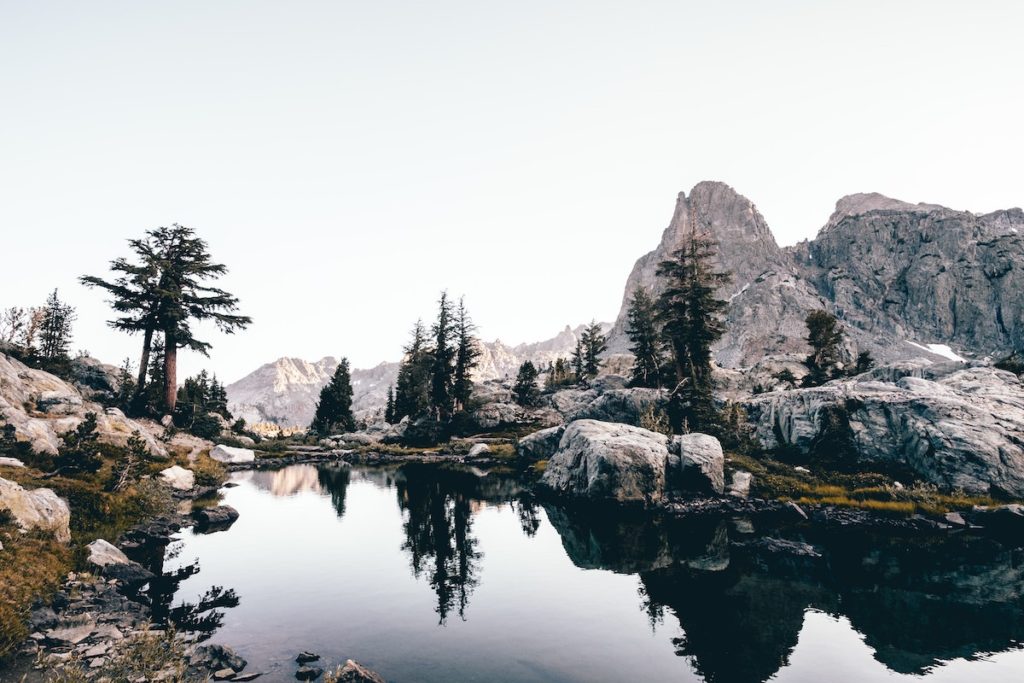The goal of the Leave No Trace movement is to spread awareness on how to minimize our impact on the natural environment. Conservation of the natural environment is necessary for the protection of native plant life and animal species. So it goes without saying that to protect these environments we want to minimize our impact on them.
Before planning any type of camping or outdoor activities, consider how you can minimize your impact on the places you visit by following the Leave No Trace Seven Principles outlined below.
- Plan ahead and prepare
- Travel and camp on durable surfaces
- Dispose of waste properly
- Leave what you find
- Minimize campfire impacts
- Respect wildlife
- Be considerate of other visitors
Plan Ahead and Prepare
Proper planning ensures the safety of yourself and your group and helps you prepare to Leave No Trace and minimize nature degradation.
Nobody sets out on an outdoor adventure to harm the land. But some may not consider the elements that exacerbate trail erosion, such as weather or trail restrictions. It’s important to stay on the trail and not to hike during rainy weather, as trekking through mud increases the rate of trail degradation.
A proper plan helps you to pack only what you need. Limit the amount of packaged foods you take along, prepare one-pot meals and lightweight snacks in reusable containers.
Meal prep in reusable containers, coffee mugs and water bottles is great for reducing the number of items you need to pack, such as bowls, plates, measuring cups or storage for meal leftovers. This not only reduces garbage but also lightens the load in your pack! Whenever possible, opt to use a camp stove to eliminate the need for a campfire.
Travel and Camp on Durable Surfaces:
The main goal when enjoying outdoor spaces is to avoid damage to the land or waterways. Failing to do so can lead to biodiversity loss in plants and organisms.
Avoid causing further soil erosion or the development of undesirable trails by staying on marked trails to reduce the formation of multiple routes that scar the landscape. If traveling off-trail is required, choose durable surfaces such as rocks, sand or gravel, and avoid vulnerable surfaces such as vegetation, living soil, or mud holes. The same goes for camping, always choose a campsite on a durable surface, and stick to camping pads in high-use areas.
Dispose of Waste Properly
There’s nothing worse than seeing trash strewn about in nature. Live by the simple mantra of “Pack it in, Pack it out.”
Any trash you take on your adventure should also return with you. Proper meal planning will help reduce the amount of waste you have to pack out. It’s also good to have an extra bag or container for packing out your waste and any other waste you find on the trails.
Wash your camp dishes 200ft away from streams and rivers. Strain the dishwater and pack out the strained organic material. Avoid dish detergents whenever possible, as biodegradable soap can affect the water quality of nearby rivers or streams.
Also, leave no trace of human waste. Urinate 200ft away from water sources and dig a cathole 6-8″ deep in a secluded spot away from trails, camp and water sources. Failure to properly dispose of your waste may attract wildlife to your camp.
Leave What You Find
We’ve all found a cool rock, leaf or shell in nature that would look perfect in our home. However, these natural objects should be left in nature. It may seem like only one rock, but if all visitors collected or picked just one rock, it would significantly impact the natural environment.
Organic materials such as leaves and sticks break down to provide the forest with nutrients for vegetation and wildlife to feed off. So please leave nature as you find it.
Minimize Campfire Impacts
Whenever possible use a camp stove instead of a fire to cook meals. Stoves are lightweight, efficient and have minimal impact.
Campfires can leave a scar on the land and increase the demand for firewood. To reduce the impact of your campfire, use an existing fire ring or a fire pan, and gather wood over a wide area away from camp.
Purchase firewood locally to the area and burn all wood to white ash. When the fire is out, break apart small coals and scatter the remains over a large area of the camp. Always remember to fully extinguish your campfire to prevent forest fires!
Respect Wildlife
Coming across wildlife on your travels will definitely add to your experience. Respect wildlife by avoiding loud noises and quick movements that may be stressful to the animals. If you’re in bear country, you’ll want to make a little noise so as not to startle the bears.
Wild animals are great to observe but do not touch, get close to, feed or pick them up. Observe wildlife from afar, store food properly at your campsite, and secure food and other waste in a food cache or your car.
Be Considerate of Others
Many go into nature to observe, slow down and relax. There is nothing worse than escaping the busyness of our daily lives to listen to your neighbour’s loud music or uncontrolled pets.
We all seek to have a different experience in nature. So be considerate, kind and safe.
These days, more people are looking to escape the hustle and bustle of everyday life and spend more time in nature. The reason we all must take the time to educate ourselves on how we can leave a positive impact when out on the trails.

